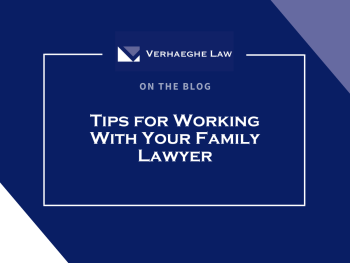Verhaeghe Law Office
Offering Personalized Legal Services for Clients Across Alberta
Verhaeghe Law Office is a full-service law firm with offices in Edmonton, Athabasca and Whitecourt making it easy for our clients to access us. Our law firm was founded in the 1940s and has been providing legal advice to Albertans ever since. A family-run law firm – we take pride in offering custom legal solutions for our client’s individual legal needs and take pride in treating our clients like family members instead of file numbers. Edmonton lawyers are passionate about law and whether you need individual legal counsel, court representation or out of court representation (through negotiations, alternative dispute resolution or arbitration) – we’re here to help. Our lawyers have a reputation for being responsive, accessible and keeping clients informed throughout the duration of their case.
Whether you're looking for an Edmonton family and divorce lawyer, wills and estates lawyer, labour and employment lawyer, criminal lawyer, real estate lawyer, construction law lawyer, immigration lawyer, civil litigation lawyer or personal injury lawyer - we can help.
Contact us today to book a consultation with our legal team.
Call Us NowPractice Areas
Family & Divorce
Lawyers
Our Edmonton family and divorce lawyers can assist with child support and custody disputes, spousal support, collaborative family law, divorce proceedings, matrimonial homes, asset divisions, adoptions and more. Book a consultation to speak with an Edmonton family lawyer today.
Learn MoreWills & Estates
Lawyers
Our Edmonton wills & estates lawyers can assist with estate planning, wills, probate applications, setting up trusts, estate litigation, settling of estates, property and asset succession, registering assets, beneficiary planning, powers of attorney and more. Contact our legal team for a consultation.
Learn MoreLabour & Employment
Lawyers
Our Edmonton labour and employment lawyers can assist on a wide variety of employment and labour law matters for both employees and employers including but not limited to wrongful dismissal, sexual harassment, human rights tribunal matters, discrimination, contracts, severance package reviews and more
Learn MoreCriminal
Lawyers
Contact our Edmonton criminal lawyers today for a consultation if you need assistance from a criminal lawyer. Whether you have been a victim of a crime or have committed a crime – our criminal lawyers can provide representation on a wide variety of criminal law matters. Book a consultation with a criminal lawyer now.
Learn MoreReal Estate
Lawyers
Whether you are looking to buy or sell property – our Edmonton real estate lawyers can help. Our lawyers can provide assistance on real estate law services including financing and refinancing, rental and leasing, closings, subdivision development and zoning and reviewing of contracts for sales and purchases.
Learn MoreImmigration
Lawyers
Our Edmonton immigration lawyers have assisted clients in Edmonton as well as abroad with their Canadian and US immigration legal matters. If you are looking for legal assistance in processing a visa, citizenship, representation in court, immigration appeals, inadmissibility issues and more – we can help.
Learn MoreConstruction Law
Lawyers
Our Edmonton construction law lawyers can provide legal assistance on builders liens, constructions liens, oil and gas liens and more. We have provided legal assistance to numerous corporations, companies and organizations on these legal matters. Contact our law office now to speak with a construction law lawyer.
Learn MorePersonal Injury
Lawyers
Our Edmonton personal injury lawyers can assist on a variety of personal injury matters including motor vehicle accidents, slip and fall claims, medical malpractice, disability claims, birth injury claims, sexual assault claims, defective product claims and more. Contact us for a free consultation with a personal injury lawyer.
Learn MoreCivil Litigation
Lawyers
Our Edmonton civil litigation lawyers are versatile and dedicated trial lawyers that can cover a wide array of civil law issues. Our lawyers are well versed and trained in various forms of procedural and substantive law. We have assisted clients across Alberta with their civil litigation needs. Contact us for help.
Learn MoreHere's How To Book A Consultation With Our Lawyers
Call or Chat with Us

Call us or live chat with us and a representative from our firm will be in touch with you within 24 hours to arrange for your consultation
Call Us NowEmail Our Law Office

Email us directly at office@freedomlaw.ca and a representative from our firm will be in touch with you within 24 hours.
Email usFill out online form

Fill out our online form and a representative from our law office will be in touch with you within 24 hours to book your consultation with us.
FILL ONLINE FORMOur 3 Office Locations in Alberta

Edmonton Office
10525 - 170 Street, Suite 203
Edmonton, AB, T5P 4W2
Phone: 587-410-2500
Email: office@freedomlaw.ca
Why Our Clients Love Us
Our lawyers have developed a great reputation within the Edmonton community as a result of our commitment and tradition of excellence. Our lawyers are provided with training on empathetic and active listening. Our law firm is also founded on the principle that every client’s legal needs are unique and different and as a result, every client is provided with legal advice with their best interests as our number one priority.

Award Winning Lawyers in Edmonton
We have been voted for our Excellence by Three Best Rated for our legal services.

Accessible & Available Lawyers
Accessible lawyers who keep you informed throughout the duration of your case.

Cost Effective Legal Solutions
We look to resolve legal issues quickly and efficiently making our lawyers cost effective.

Multiple Offices to Serve you Better
With three offices in Alberta: Edmonton, Athabasca & Whitecourt, we are able to serve our clients better regardless of where you live.
Testimonials
Real Estate Law Testimonial 
I contacted Verhaeghe Law Office with an “emergency “ on short notice. The administrative paperwork was very minor in nature and for the bank. The only day the legal work could be done to meet the banks deadline was on a Sunday. My request was accommodated by Richard Verhaeghe with no hesitation. I highly recommend to anyone looking for legal council to contact this firm as they obviously care about their clients.
- LS
Divorce Law Testimonial 
Tammy Olson was an incredible family lawyer during an emotional time in my life dealing with parenting and child support matters. She walked me through all my options and possible outcomes for each. Throughout my time with Tammy, she never made me feel my case wasn’t a priority and was easy to get in contact with when needed.
- LN
Our Lawyers Are Proud To Give Back To the Community
Our Edmonton lawyers are proud to give back to the community and are involved in a wide variety of charitable organizations. From donating to animal rescues and food banks – our lawyers are highly active in the community and give back as much as we can to help look out for one another. Contact us for more information on how we’ve helped our local communities with our charitable initiatives.
Read Our Law Blog

It can be difficult to navigate the legalities of a family issue, especially when it comes to mediation and arbitration. Problems may sometimes arise, adding stress to what is probably already an emotional process. It may be a good idea to familiarize yourself with some of these potential challenges ahead of time, so you can […]
Read More
Brain and spinal cord injuries can have massive consequences on your quality of life. It may impact your ability to work and could result in the need for lifelong medical assistance. If you or a loved one has sustained a spinal cord or brain injury, you may be entitled to compensation and will likely require […]
Read More
There are many reasons why you may require the assistance of a family lawyer. Whether you are undergoing a separation, divorce, adoption, or any other legal changes to your family unit, a family lawyer may be able to offer necessary guidance and support. Family law can be complex. To ensure your process goes as smoothly […]
Read More





